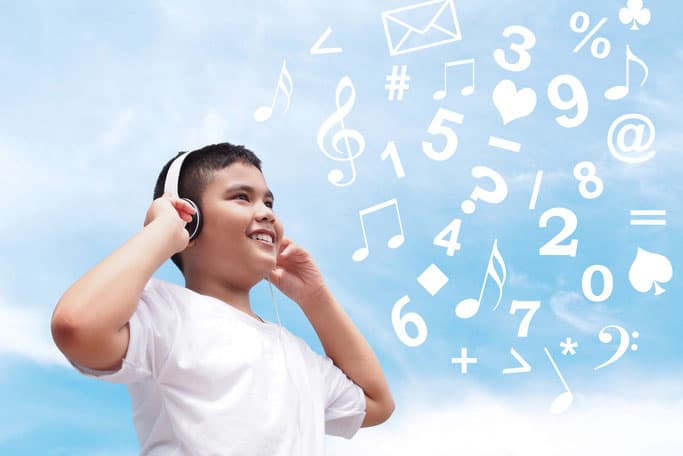In 1993, researchers published results of an experiment that suggested listening to Mozart could improve performance on any IQ test taken within 15 minutes of listening to the music. Even before the advent of “click bait”, media reports shortened those experimental results into headlines such as “Listening to Mozart makes you smarter” and thousands of parents purchased CDs (remember those?).
While there is no real “Mozart Effect,” there is an abundance of research that examines the relationship between music and learning. That research tells us that merely listening to music doesn’t make us smarter, but playing music – actively making music – can have profound educational benefits, particularly in children. Alzein Pediatrics is here to explain.
Ever since the misunderstood Mozart experiment, researchers have been trying to isolate variables and prove a connection between music and educational performance with many of these efforts targeting the specific relationship between music and math. Research shows that musically-trained students do outperform their non-musical peers on math tests. But is this correlation actually causation? Does this mean that musical-training really improves mathematical abilities?
Mathematicians will tell you that music and math are ultimately the same kind of operation: identifying patterns. For instance, each note on a musical scale has a frequency about 5% greater than the note before it. This regular ratio means that every note has twice the frequency as its corresponding note in the octave below. Since music is regulated by math, the hypothesis is that understanding music trains a child to better understand math.
Psychologists and neuroscientists have added to our understanding of the music/math relationship by noting that the auditory, visual, and motor areas of the brain are more developed in expert musicians. More than just a function of use, these brain changes impact spatial-temporal skill reasoning which is the reasoning we use when we make music and when we learn. Research shows that even limited musical interventions can improve math scores, and likely improve reading ability as well.
What we don’t know is whether the playing of music makes children better at math or whether playing music is just an opportunity to exercise the mind, making the brain slightly mentally quicker. Whatever the ultimate scientific answer is, there’s plenty of research that does demonstrate a connection between playing an instrument and improved academic performance.
Before you go buy your toddler a tuba, consider what all this research is really telling us. Many studies report a link between music and learning, despite using very different musical approaches. Some studies look at high school band members, some look at teacher-musicians in the elementary school classroom. One study found cognitive improvements in adults playing piano-harmonicas. The type of music and instrument don’t seem to have a profound impact on results. If mathematicians and neuroscientists are right and the relationship between music and learning is about pattern recognition and spatial-temporal reasoning, learning about music, including rhythm, pitch, harmony and more, and how to make it matters more than the instrument played.
Children can begin exploring the world of musical and mathematical patterns early and often, but they become more capable of making “real” music around 4 or 5 years of age. Around 4th or 5th grade, your child transition to more complex instruments as they develop.
There are additional benefits to making music, particularly in groups, beyond improved learning. Playing in a band or orchestra exposes your child to more complex forms of music, with new patterns and abstractions. Research shows that making music with a group promotes better social-emotional awareness, and of course, your child will form long-lasting and positive relationships with their bandmates.
The best part is that making music doesn’t have to stop when your child becomes an adult. Even if they don’t play professionally, making music can continue to be a joy for many years to come.
Do you have questions about the benefits of fine arts? Message your Alzein Pediatrics provider through your portal and we’ll help!


